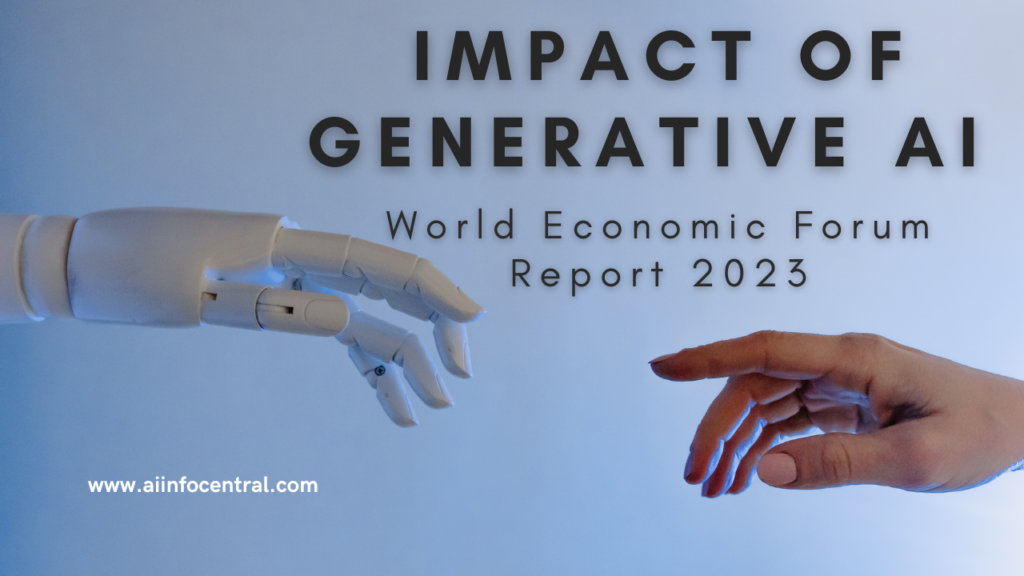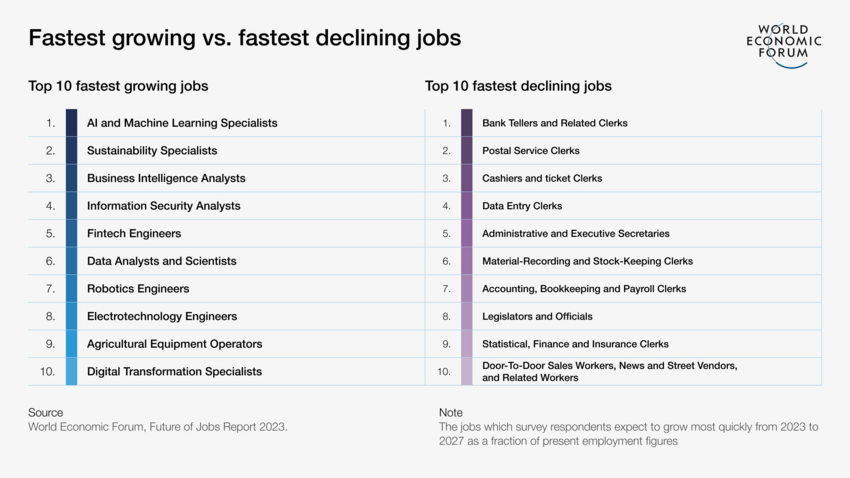
The Future of Jobs Report 2023 from the World Economic Forum analyzes the major impact of generative AI on the global labor force and acts as a compass in a time when technology is king. This extensive poll, which covers 300 businesses and 26 countries, provides insight into the changing skills that will be essential for the future and the possible changes that the labor market may experience.
Generative AI Reshaping Industries
The artificial intelligence subset known as “generative” AI, which produces original text, images, and videos, is leading this change. The analysis predicts a revolutionary change in a number of industries, including healthcare, banking, and education. In addition to revolutionizing goods and services, generative AI has the potential to automate jobs that have historically been performed by humans, changing the nature of employment itself.
Anticipating Job Disruptions
Change often follows innovation, and this analysis indicates that within the next five years, generative AI may disrupt up to 25% of jobs. This disruption affects workers of all skill levels and is not limited to any particular industry. Rather, it affects every sector. The paper highlights how critical it is to learn new skills quickly in order to stay competitive and effectively manage this approaching change.
Crucial Future Skills: Impact of Generative AI
1.Creativity:
In a world where automated chores are taking over, creativity becomes a workforce beacon. Being able to think creatively and come up with new ideas becomes essential for people who want to stay ahead. Collaborative creativity is emphasized as a critical component of future success, as teams work together to create innovative products and services.
2.Emotional Intelligence:
Generative AI has an impact that goes beyond technical proficiency; emotional intelligence becomes a crucial distinction. The necessity of comprehending and controlling one’s own emotions as well as those of others is emphasized in the study. This ability highlights the lasting worth of human connection in an automated environment and is essential for fostering solid connections with clients and coworkers.
3.Digital Skills:
The workforce of the future will demand proficiency with digital tools and technologies; this is a non-negotiable prerequisite. It is emphasized that using machine learning tools for AI system creation and data analytics tools for in-depth analysis are critical skills. In an increasingly digitalized labor market, having digital skills is essential for being competitive and relevant.
The Jobs AI Could Create: A Glimpse into the Future Employment Landscape
Not only will artificial intelligence cause disruption, but it will also lead to the emergence of new, dynamic positions that will influence the nature of the workforce in the future. The Future of professions Report 2023 from the World Economic Forum offers an intriguing look at the kinds of professions that artificial intelligence might produce and insights into how the labor market is changing.
Emerging Roles in the AI Era:
According to the research, among rising positions, experts in digital transformation, data analysis and science, and artificial intelligence and machine learning are in high demand. These jobs are expected to rise significantly; by 2027, there will be a 40% increase in the number of AI and machine learning specialists. Comparably, a significant 31% increase in need for information security analysts is anticipated, along with a 30–35% growth in demand for positions like data analysts, scientists, and big data professionals. When taken as a whole, these trends may help create about 2.6 million new jobs.
Fastest Growing vs. Fastest Declining Jobs:
The research includes a detailed table that lists the top 10 jobs that are expected to increase or shrink at the fastest rate over the next five years. It is not unexpected that experts in artificial intelligence and machine learning are in high demand; this is a reflection of how quickly the field is developing. This denotes a fundamental change toward skill sets that meet the expectations of the upcoming technology.

Companies Adapting to Change:
Companies are reassessing their training goals as a result of the profound changes in the employment market. According to the survey, through 2027, firm training strategies place teaching employees to work with AI and big data as the third-highest priority. Surprisingly, it ranks first for businesses with more than 50,000 workers. This emphasizes how important it is for businesses to give their employees the skills they need to succeed in an AI-driven future.
In summary:
In conclusion, a clear picture of the approaching workplace upheaval driven by the Impact of Generative AI is presented in the World Economic Forum’s Future of Jobs Report 2023. The need for adaptable skills like creativity, emotional intelligence, and digital competency is growing as sectors go through radical transformations. Proactive action is necessary to navigate this paradigm change, and those who possess these abilities will fare better in the uncertain future. Remain aware, welcome change, and prosper in the era of artificial intelligence.